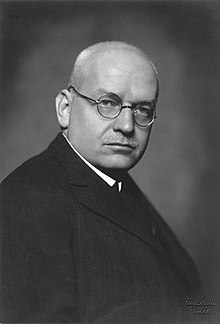Hans Luther: Difference between revisions
mNo edit summary |
|||
| Line 25: | Line 25: | ||
In 1930, Hans Luther was made president of [[Reichsbank]]. Soon after he was made German ambassador to the United States, a position he held from 1933 to 1937, after which he retired. |
In 1930, Hans Luther was made president of [[Reichsbank]]. Soon after he was made German ambassador to the United States, a position he held from 1933 to 1937, after which he retired. |
||
In 1933 Luther |
In 1933, Luther lectured at the [[Columbia University]] campus. Luther's speech stressed Hitler's "peaceful intentions" toward his European neighbors. [[Nicholas Murray Butler]], Columbia's president, rejected student appeals to cancel the invitation, calling the request "illiberal" and citing the need for academic freedom.<ref>[http://select.nytimes.com/gst/abstract.html?res=F30B16FF3F5516738DDDA90A94D9415B838FF1D3&scp=1 "DR. BUTLER REFUSES TO BAR NAZI ENVOY; Columbia Head Rejects Plea by Students to Cancel Dr. Luther's Address. CALLS REQUEST ILLIBERAL Stresses Need for Academic Freedom – Club Is Reported Planning Demonstration."], ''[[The New York Times]]'', 20 November 1933. Accessed 28 August 2008.</ref> |
||
After the Second World War, Luther came out of retirement to become an advisor for the new government. |
After the Second World War, Luther came out of retirement to become an advisor for the new government. |
||
Revision as of 06:59, 8 May 2013
Hans Luther | |
|---|---|
 | |
| Chancellor of Germany 9th Chancellor of the Weimar Republic | |
| In office 15 January 1925 – 12 May 1926 | |
| Preceded by | Wilhelm Marx |
| Succeeded by | Wilhelm Marx |
| Personal details | |
| Born | 10 March 1879 Berlin |
| Died | 11 May 1962 (aged 83) Düsseldorf |
| Political party | None |
| Profession | lawyer |
Hans Luther (10 March 1879 – 11 May 1962) was a German politician and Chancellor of Germany for 482 days.
Life and career
Born in Berlin, Luther started in politics in 1907 by becoming the town councillor in Magdeburg. He continued on becoming secretary of the German Städtetag in 1913 and then mayor of Essen in 1918. In December 1922, Chancellor Wilhelm Cuno appointed Luther minister of Food and Agriculture.
He kept his position in 1924 when Wilhelm Marx became Chancellor. In 1925, he was appointed Chancellor of Germany, but Marx resumed office the following year. Luther also briefly acted as head of state following the death of Friedrich Ebert.[citation needed]
In 1930, Hans Luther was made president of Reichsbank. Soon after he was made German ambassador to the United States, a position he held from 1933 to 1937, after which he retired.
In 1933, Luther lectured at the Columbia University campus. Luther's speech stressed Hitler's "peaceful intentions" toward his European neighbors. Nicholas Murray Butler, Columbia's president, rejected student appeals to cancel the invitation, calling the request "illiberal" and citing the need for academic freedom.[1]
After the Second World War, Luther came out of retirement to become an advisor for the new government.
He died in Düsseldorf.
Hans Luther's First Cabinet, January – December 1925
- Hans Luther, Chancellor
- Gustav Stresemann (DVP), Minister of Foreign Affairs
- Martin Schiele (DNVP), Minister of the Interior
- Otto von Schlieben (DNVP), Minister of Finance
- Albert Neuhaus (DNVP), Minister of Economics
- Heinrich Brauns (Z), Minister of Labour
- Josef Frenken (Z), Minister of Justice
- Otto Gessler (DDP), Minister of Defence
- Karl Stingl (BVP), Minister of Posts
- Rudolf Krohne (DVP), Minister of Transport
- Gerhard Graf von Kanitz, Minister of Food
Changes
- 26 October 1925 – Schiele, Schlieben, and Neuhaus resign from the Cabinet. They are replaced on an acting basis by Gessler (who remains also Defense Minister) at Interior, Luther (who remains also Chancellor) at Finance, and Krohne (who remains also Transport Minister) at Economics.
- 21 November 1925 – Frenken resigns as Justice Minister and is replaced on a temporary basis by Chancellor Luther
Luther's Second Cabinet (January – May 1926)
- Hans Luther, Chancellor
- Gustav Stresemann (DVP), Minister of Foreign Affairs
- Wilhelm Külz (DDP), Minister of the Interior
- Peter Reinhold (DDP), Minister of Finance
- Julius Curtius (DVP), Minister of Economics
- Heinrich Brauns (Z), Minister of Labour
- Wilhelm Marx (Z), Minister of Justice
- Otto Gessler (DDP), Minister of Defence
- Karl Stingl (BVP), Minister of Posts
- Rudolf Krohne (DVP), Minister of Transport
- Heinrich Haslinde (Z), Minister of Food
References
Further reading
- Clingan, C. Edmund (2010). The Lives of Hans Luther, 1879–1962: German Chancellor, Reichsbank President, and Hitler's Ambassador. Lexington Books.

